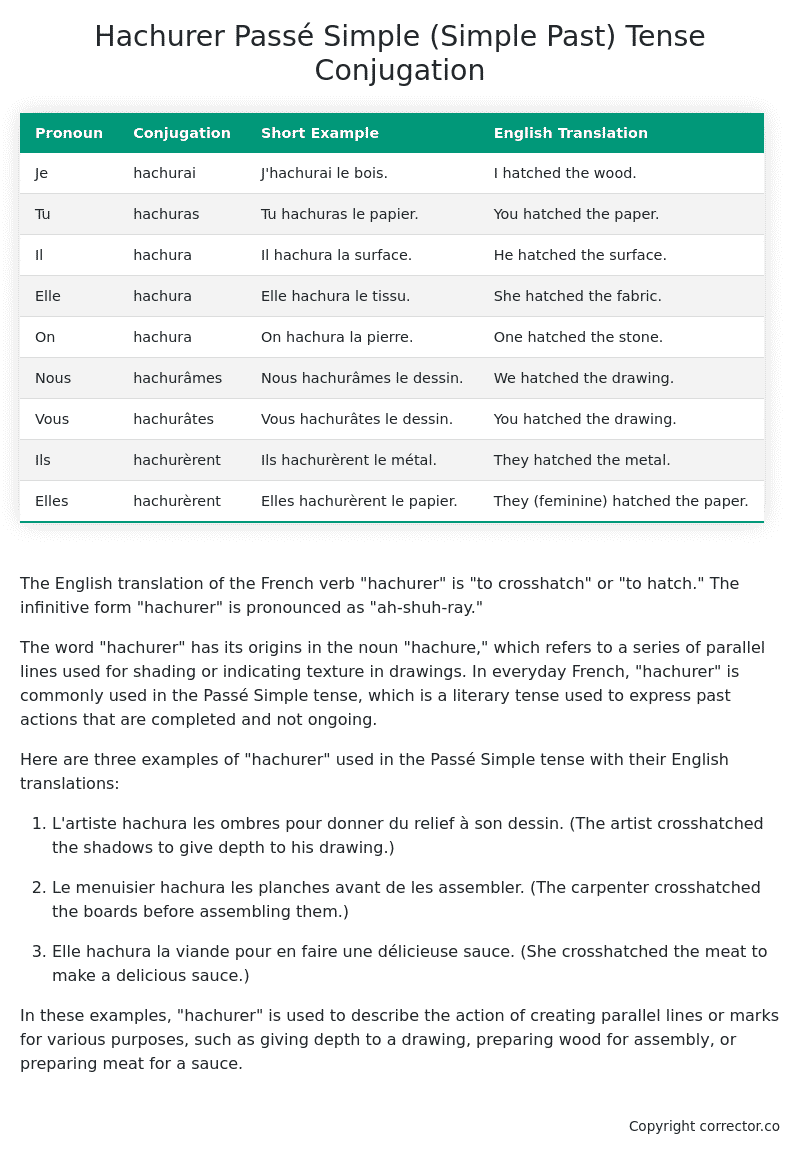Passé Simple (Simple Past) Tense Conjugation of the French Verb hachurer
Introduction to the verb hachurer
The English translation of the French verb “hachurer” is “to crosshatch” or “to hatch.” The infinitive form “hachurer” is pronounced as “ah-shuh-ray.”
The word “hachurer” has its origins in the noun “hachure,” which refers to a series of parallel lines used for shading or indicating texture in drawings. In everyday French, “hachurer” is commonly used in the Passé Simple tense, which is a literary tense used to express past actions that are completed and not ongoing.
Here are three examples of “hachurer” used in the Passé Simple tense with their English translations:
-
L’artiste hachura les ombres pour donner du relief à son dessin.
(The artist crosshatched the shadows to give depth to his drawing.) -
Le menuisier hachura les planches avant de les assembler.
(The carpenter crosshatched the boards before assembling them.) -
Elle hachura la viande pour en faire une délicieuse sauce.
(She crosshatched the meat to make a delicious sauce.)
In these examples, “hachurer” is used to describe the action of creating parallel lines or marks for various purposes, such as giving depth to a drawing, preparing wood for assembly, or preparing meat for a sauce.
Table of the Passé Simple (Simple Past) Tense Conjugation of hachurer
| Pronoun | Conjugation | Short Example | English Translation |
|---|---|---|---|
| Je | hachurai | J’hachurai le bois. | I hatched the wood. |
| Tu | hachuras | Tu hachuras le papier. | You hatched the paper. |
| Il | hachura | Il hachura la surface. | He hatched the surface. |
| Elle | hachura | Elle hachura le tissu. | She hatched the fabric. |
| On | hachura | On hachura la pierre. | One hatched the stone. |
| Nous | hachurâmes | Nous hachurâmes le dessin. | We hatched the drawing. |
| Vous | hachurâtes | Vous hachurâtes le dessin. | You hatched the drawing. |
| Ils | hachurèrent | Ils hachurèrent le métal. | They hatched the metal. |
| Elles | hachurèrent | Elles hachurèrent le papier. | They (feminine) hatched the paper. |
Other Conjugations for Hachurer.
Le Present (Present Tense) Conjugation of the French Verb hachurer
Imparfait (Imperfect) Tense Conjugation of the French Verb hachurer
Passé Simple (Simple Past) Tense Conjugation of the French Verb hachurer (You’re reading it right now!)
Passé Composé (Present Perfect) Tense Conjugation of the French Verb hachurer
Futur Simple (Simple Future) Tense Conjugation of the French Verb hachurer
Futur Proche (Near Future) Tense Conjugation of the French Verb hachurer
Plus-que-parfait (Pluperfect) Tense Conjugation of the French Verb hachurer
Passé Antérieur (Past Anterior) Tense Conjugation of the French Verb hachurer
Futur Antérieur (Future Anterior) Tense Conjugation of the French Verb hachurer
Subjonctif Présent (Subjunctive Present) Tense Conjugation of the French Verb hachurer
Subjonctif Passé (Subjunctive Past) Tense Conjugation of the French Verb hachurer
Subjonctif Imparfait (Subjunctive Imperfect) Tense Conjugation of the French Verb hachurer
Subjonctif Plus-que-parfait (Subjunctive Pluperfect) Tense Conjugation of the French Verb hachurer
Conditionnel Présent (Conditional Present) Tense Conjugation of the French Verb hachurer
Conditionnel Passé (Conditional Past) Tense Conjugation of the French Verb hachurer
Conditionnel Passé II (Conditional Past II) Tense Conjugation of the French Verb hachurer
L’impératif Présent (Imperative Present) Tense Conjugation of the French Verb hachurer
L’impératif Passé (Imperative Past) Tense Conjugation of the French Verb hachurer
L’infinitif Présent (Infinitive Present) Tense Conjugation of the French Verb hachurer
L’infinitif Passé (Infinitive Past) Tense Conjugation of the French Verb hachurer
Le Participe Présent (Present Participle) Tense Conjugation of the French Verb hachurer
Le Participe Passé (Past Participle) Tense Conjugation of the French Verb hachurer
Struggling with French verbs or the language in general? Why not use our free French Grammar Checker – no registration required!
Get a FREE Download Study Sheet of this Conjugation 🔥
Simply right click the image below, click “save image” and get your free reference for the hachurer Passé Simple tense conjugation!

Hachurer – About the French Passé Simple (Simple Past) Tense
Formation
Usage
Narration
Historical Context
Interactions with other tenses
Passé Composé
Imparfait
Conditional and Subjunctive
Summary
I hope you enjoyed this article on the verb hachurer. Still in a learning mood? Check out another TOTALLY random French verb conjugation!


